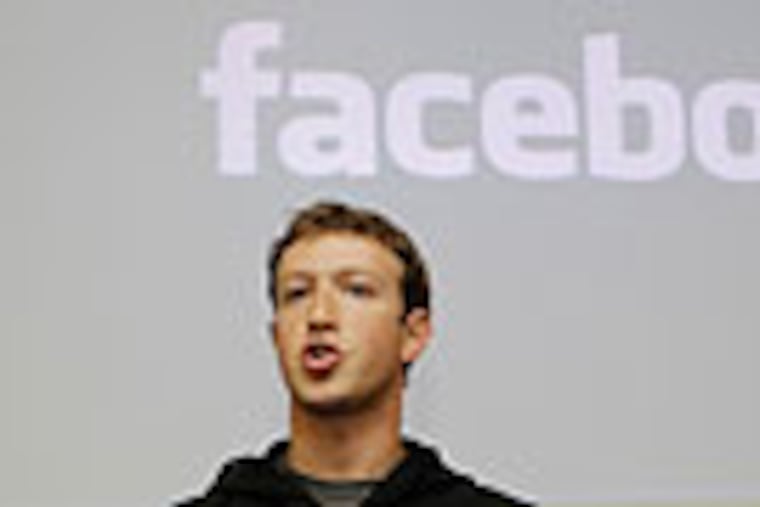Facebook faces the critics
NEW YORK - In Facebook's vision of the Web, you would no longer be alone and anonymous. Internet sites would reflect your tastes and interests, as you expressed them on Facebook, and you wouldn't have to fish around for news and songs that interest you.

NEW YORK - In Facebook's vision of the Web, you would no longer be alone and anonymous. Internet sites would reflect your tastes and interests, as you expressed them on Facebook, and you wouldn't have to fish around for news and songs that interest you.
That sounds like a convenience for users of the online social network. Privacy advocates and many Facebook users have a different view.
They have a growing concern about privacy, most recently complaints that the site forced them to share personal details with the rest of the online world or be dropped from Facebook profiles altogether.
Facebook responded to the backlash this week by simplifying its privacy controls, so users can protect the status updates and photos they have posted in the past.
"A lot of people are upset with us," founder and chief executive Mark Zuckerberg acknowledged at a news conference at Facebook's Palo Alto, Calif., headquarters.
The changes came after Facebook rolled out a slew of features in April that spread the network's reach to the broader Web. Among them was a program called "instant personalization" that draws information from a person's profile to customize sites such as the music service Pandora. Some users found it creepy, not cool.
Privacy groups have complained to regulators, and some people threatened to quit the site. Even struggling MySpace jumped in to capitalize on its rival's bad press by announcing a "new, simpler privacy setting."
To address complaints that its settings were getting too complex, Facebook will now give users the option of applying the same preferences to all their content, so that with one click you can decide whether to share things with just Facebook "friends" or with everyone on the Internet.
For those who found it complicated to prevent outside websites and applications from gaining access to Facebook data, there's now a way to do so in a couple of clicks.
It's not clear whether the changes will quell the unease among Facebook users, which has threatened to slow the site's breakneck evolution from a scrappy college network - created by Zuckerberg in 2004 while he was a Harvard student - to an Internet powerhouse with nearly a half-billion people.
"They've lost the users' trust. That's the problem," said Marc Rotenberg, executive director of the Electronic Privacy Information Center, an advocacy group. "In the earlier days, there was time to regain it. It's not so clear now. I think it's getting more serious than making changes and moving on."
Some of Facebook's loudest critics offered cautious praise but indicated the young company would need to do more to prove it cared about privacy.
Sen. Charles E. Schumer (D., N.Y.) called it a "significant first step that Facebook deserves credit for," but added he would still prefer that Facebook require users to actively turn on sharing with outside sites, rather than having sharing be the default setting from which they have to opt out.
The company's lifeblood is advertising. It makes money by letting businesses target ads to specific types of users - such as 30-year-old single men living in Brooklyn who are interested in motorcycles and yoga.
Zuckerberg, who turned 26 this month, says his vision is not about the ad dollars. He was 22, he said, when "Yahoo and Viacom and all these companies" were clamoring to buy Facebook, offering $1 billion or more. For a 22-year-old to pass that up might be kind of crazy, he acknowledged, but he said it showed "it's not about the money."
Even so, convincing people that sharing more is good for them has at times been an uphill battle. Users revolted against Beacon, a Facebook feature that broadcast people's activities on dozens of outside sites when it launched in 2007. Facebook scrapped the program as part of a legal settlement.
More recently, Facebook has come under fire for a security glitch that exposed some users' private chats, and another that revealed users' information to advertisers in a way they could identify them, going against Facebook's own terms of service.
A Simpler Facebook
Sharing data: Instead of needing to declare sharing preferences for each photo, status update, or other information individually, users will be able to apply the same preference to everything with one click.
Public data: Less information will automatically be made public. A user can now hide her hometown and the pages for hobbies and other interests, for example.
Updates: Privacy settings will be changed less often. Users say Facebook's frequent updates were confusing.
Outside applications and websites: Users will be able to turn them all off, instead of having to deny them access to personal data one-by-one.
SOURCE: Associated PressEndText